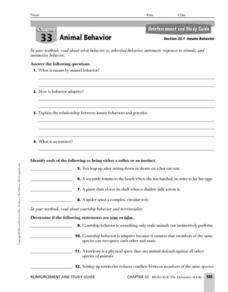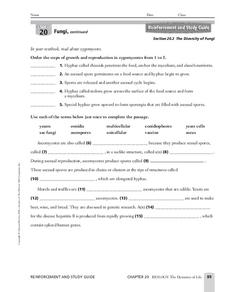Curated OER
Innate Behavior
In this innate behavior worksheet, students compare inherited behavior and instinctive behavior. Students also look at behaviors resulting from internal and external cues. This worksheet has 4 short answer, 4 matching, 4 true or false,...
Curated OER
Human Heredity Traits
Completing an idea map based on various inheritance factors and mistakes, 9th graders review their knowledge of genetic disorders. While the activity is based on chapter 15 of an unnamed textbook, the questions at the bottom of the page...
Curated OER
Mollusks
In this mollusks worksheet, students will review the characteristics of the three major classes of mollusks: gastropods, bivalves, and cephalopods. This worksheet has 17 matching, 6 short answer, 9 fill in the blank, and 4 true or false...
Curated OER
Patterns of Heredity Vocabulary
Test your students' biology vocabulary skills with this review sheet, in which students define twelve different vocabulary terms related to patterns of heredity. Using the word bank provided, 9th graders complete eight sentences with the...
Curated OER
Genetic Technology
In this genetic technology worksheet, students will answer 6 true or false statements and 4 short answer questions based on the mapping and sequencing of the human genome and the applications of the Human Genome Project.
Curated OER
Life Substance
In this life substances worksheet, students will review carbon atoms, monosaccharides, dissaccharides, polysaccharides, lipids, proteins, and nucleic acids. This worksheet has 4 true or false and 17 matching questions.
Curated OER
What is a Plant?
For this plant worksheet, students will review the origins and adaptations of plants including the alternation of generations. This worksheet has 8 short answer, 6 fill in the blank, and 4 multiple choice questions.
Curated OER
Defense Against Infectious Diseases
In this infectious disease defense instructional activity, students will review the immune system including acquired, antibody, and cellular immunity. Students will then compare passive and active immunity to infectious diseases. This...
Curated OER
The Nature of Disease
In this diseases worksheet, students will learn about infectious diseases including what causes a diseases and how they are spread. Students will also review symptoms of disease, patterns of diseases, and treating diseases. This...
Curated OER
Bones: The Body's Support
In this bones worksheet, students compare the axial and the appendicular skeletons. Students also review the bone components. This worksheet has 6 matching, 8 short answer, 4 fill in the blank, and 6 true or false questions.
Curated OER
Roots, Stems, and Leaves
In this plant activity, learners review the structure and function of roots, stems, and leaves. This activity has 5 matching, 7 true or false, 4 multiple choice, and 10 fill in the blank questions.
Curated OER
Muscles for Locomotion
For this muscles worksheet, students review the characteristics of the 3 types of muscles: smooth, skeletal, and cardiac. This worksheet has 7 matching and 4 short answer questions.
Curated OER
Genetic Technology
In this genetic learning exercise, students will complete 4 fill in the blank questions about selective breeding and determining genotypes. Then students will use a Punnett square to determine the genotype for two different breeding...
Curated OER
Cnidarians
For this cnidarians worksheet, students will read 4 descriptions and identify each as either the polyp or medusa form of cnidarian. Then students will complete 3 short answer questions about the characteristics of cnidarians. Finally,...
Curated OER
Body Plans and Adaptations
For this body plans and adaptations worksheet, students will review the different types of symmetry found in organisms. Students will identify body parts as found on either the ventral or dorsal part of an animal. Then students will look...
Curated OER
What is an Animal?
In this animal classification worksheet, high schoolers will review the characteristics used in classifying animals including the development of animals. Students will compare the endoderm, ectoderm, and mesoderm. This worksheet has 4...
Curated OER
Mechanisms of Evolution
In this evolution worksheet, students will answer questions about population genetics and the theory of evolution of species. This worksheet has 15 true or false, 6 fill in the blank, and 4 short answer questions.
Curated OER
The Diversity of Fungi
In this fungi worksheet, students will review the growth and reproduction of zygomycetes and the characteristics of ascomycotes, basidiomycotes, and deuteromycotes. This worksheet has 15 fill in the blank, 4 short answer, and 8 matching...
Curated OER
Birth, Growing, and Aging
In this human development worksheet, students will review the three stages of birth and how your growth rate changes from childhood through adolescence to adulthood. This worksheet has 3 short answer questions, 4 fill in the blank, and 5...
Curated OER
The Circulatory System
For this circulatory system worksheet, students review the functions of red blood cells, white blood cells, and platelets. Students label the parts of a human heart on a diagram. This worksheet has 4 short answer, 13 matching, and 9 true...
Curated OER
Birds
In this birds activity, students review the characteristics of birds including their adaptations for flight. Students review the diversity of bird adaptations. This activity has 4 short answer, 7 true or false, 6 matching, and 3 fill in...
Curated OER
Biomes
In this biomes worksheet, learners review the characteristics of aquatic biomes and terrestrial biomes. This worksheet has 12 fill in the blank, 6 multiple choice, and 4 short answer questions.
Curated OER
Non-Seed Vascular Plants
In this non-seed vascular plant activity, students review the characteristics of sporophytes, lycophytes, sphenophytes, and pterophytes. This activity has 19 fill in the blank, 4 true or false, and 2 short answer questions.
Curated OER
Mammals
In this mammals worksheet, students review terms associated with the different types of mammals. This worksheet has 6 fill in the blank and 4 matching questions.























